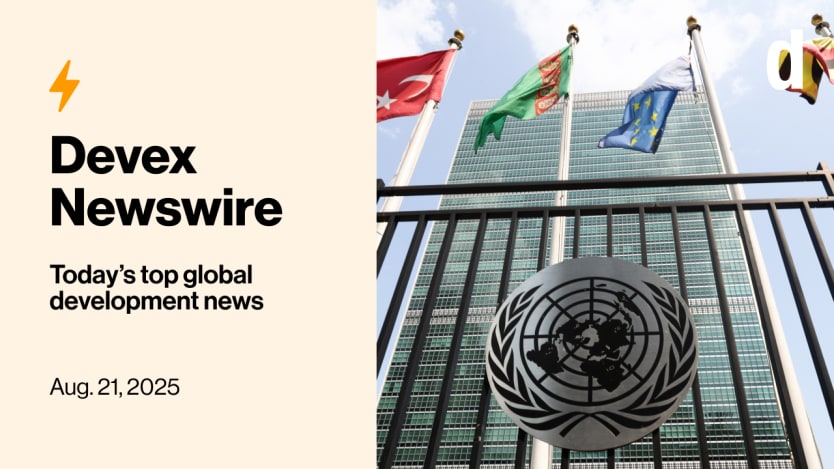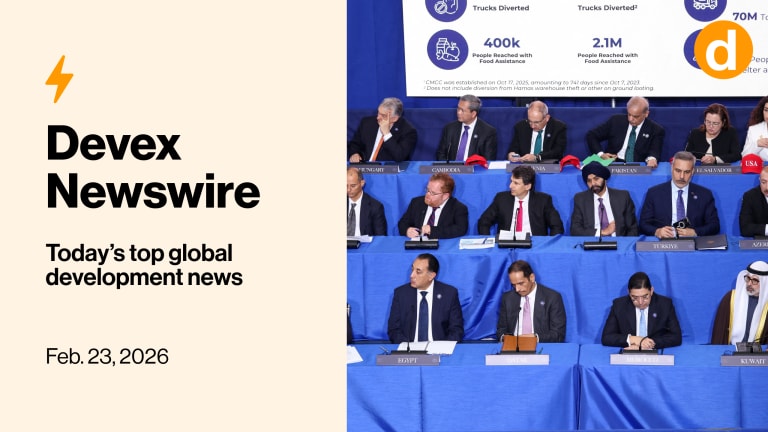Devex Newswire: US pushes UN to rethink aid, cut reliance on Washington
Presented by Concordia

The U.S. State Department called for a “fundamental rethink” of the U.N. system, urging other donors to step up. It outlined priorities of peace, sovereignty, and liberty – while criticizing peacekeeping and human rights agendas.
Also in today’s edition: Refugees in Malawi struggle with hunger after WFP cuts, and USAID employees can pursue a class action claim against Elon Musk and DOGE.
UNGA strike
The United States has set out its agenda for the upcoming United Nations General Assembly — and it’s all about shaking up the system. In an email shared with U.S. embassies and obtained by Devex, the State Department called for a “fundamental rethink” of humanitarian aid and warned that “it is imperative for other donors to step up.”
“For decades, the United States has led the world in shouldering the burden of international humanitarian assistance,” the email reads. But after cutting funding to several U.N. agencies, freezing programs, and slashing the U.N. peacekeeping budget by $361 million, the Trump administration is making clear that Washington won’t keep carrying the load, my colleague Elissa Miolene writes.
The email outlines three priorities — peace, sovereignty, and liberty — while criticizing the U.N. and “certain” member states for promoting what it called a “highly politicized liberal agenda against the sovereign prerogatives of other states.”
“The UN system has been used to expand so-called human rights in a manner that makes a mockery of traditional notions of liberty,” it adds.
The U.S. says it will “strongly oppose” efforts to impose binding rules that “infringe on national sovereignty,” while insisting it will defend “freedom of expression, association, peaceful assembly, and religion or belief.” Yet critics point out that the Trump administration’s record on free speech has been inconsistent, cracking down on student protesters, law firms, and parts of the press.
In the end, the message was blunt: “Multilateralism is not inherently virtuous,” the email concludes. Instead, international bodies should act as “useful convening forums” where sovereign states discuss common concerns — not dictate them.
Exclusive: A first look at the Trump administration’s UNGA priorities
Related opinion: At 80, the UN must hold the line on protection
+ Join us next week for Devex Pro Week 2025! We’ll have a packed agenda with events, insider articles, and in-depth reports digging into key issues facing our professional members, namely the impact of a turbulent 2025 on philanthropy, multilateral development banks, the United Nations, bilateral donors, and INGOs.
Not yet gone Pro? We are offering a limited-time offer of $100 off an annual membership. Sign up now and also get full access to Pro content for a year!
Little refuge
Malawi’s Dzaleka refugee camp — built to house 12,000 people in 1994 but now holding nearly 60,000 — is in a downward spiral following aid cuts. Refugees from the Democratic Republic of Congo, Burundi, Somalia, and Rwanda face halved food rations, soaring prices, and shrinking services. “Most of the refugees fled protracted conflict … WFP’s food assistance is their primary means of survival,” says Hyoung-Joon Lim, the World Food Programme country representative and director for Malawi.
Community leaders warn the fallout is brutal, writes Madalitso Wills Kateta for Devex. “Women and children are now more vulnerable to exploitation and abuse due to lack of protection services and security,” says Abdikariim Ismael Taashiir, a Somali leader.
Crime is up, children are pushed into work, and families are resorting to early marriages. District social welfare officer Jonathan Bonongwe warns of rising HIV/AIDS and other sexually transmitted infections.
Advocates say long-term solutions must move beyond rations. “This is more than an economic decision; it is a direct threat to human dignity, safety, and the hope for any meaningful future for refugees in Malawi,” says Innocent Magambi, CEO at Inua Advocacy. He argues that outdated laws in Malawi that trap refugees in camps must change: Local integration may be the only realistic and “humane option.”
“I at times find myself thinking that I am a stateless person,” Louisa — a 22-year-old pushed into sex work to support her daughter — tells Madalitso. “Malawi has always seemed like a better home for me and my daughter. I only hope the government will soften its stance on the refugee laws.”
Read: US aid cuts leave refugees in Malawi desperate and hungry
ICYMI: How US aid cuts hurt migrant and refugee programs
DOGE chargers
A federal judge has ruled that USAID employees can pursue a class action claim against Elon Musk and his Department of Government Efficiency, or DOGE, the budget-slashing office that fired nearly all the agency’s employees earlier this year.
The ruling came after the U.S. Supreme Court limited the use of universal injunctions, prompting advocates to turn to class action litigation for federal workers affected by mass reductions in force. With a class action lawsuit, multiple people can sue on behalf of a larger group with similar claims — giving the individuals a stronger collective voice than they might have if pursuing such claims on their own, Elissa tells me.
“Today’s ruling is another important step towards accountability on behalf of the thousands whose lives and work have been upended by Musk and Trump’s callous dismantling of USAID,” says Tianna Mays, legal director for Democracy Defenders Fund, which filed the case alongside USAID employees earlier this year. “This was an unconstitutional power grab and it is essential that the Trump administration answers for it.”
For months, plaintiffs have been arguing that DOGE’s efforts to merge USAID into the State Department — and terminate thousands of employees in the process — violated the appointments clause, and ignored the separation of powers by sidestepping Congress. That case is still ongoing, with U.S. District Judge Theodore Chuang rejecting the government’s motion to dismiss it last week.
Further reading: Court watch — the latest on the USAID docket
Doing more with less
The Global Agriculture and Food Security Program, or GAFSP, was launched in 2010 after a food price spike that pushed millions into poverty, it’s since funneled $2 billion into more than 190 projects worldwide — from greenhouses in Rwanda to irrigation in Honduras — reaching some 20 million rural people.
But with donor budgets shrinking, the fund, which is housed at the World Bank, is expecting next year’s replenishment cycle to be leaner. “I don’t anticipate it being massively ambitious,” GAFSP program manager Natasha Hayward tells my colleague Ayenat Mersie. “But even with this more boutique level of financing, we think we can put that to very impactful use.”
The U.S. has been the program’s biggest backer at $818 million, followed by Germany and Canada. Still, Hayward says GAFSP’s real strength is its flexibility: “We have this nimble instrument,” she says. “If we have more limited resources … how can that be as catalytic, as impactful as possible?”
That nimbleness includes direct support to farmer groups. “Farmers themselves are private sector actors,” she says, pointing to dedicated windows for both governments and producers. With NGO funding drying up, “the value of that is amplified.”
Read: Amid funding crunch, GAFSP rethinks role in global food security
+ For more content like this, sign up for Devex Dish, our free, weekly newsletter covering the transformation of the global food system.
In other news
A WFP aid convoy came under attack near the famine-hit Sudanese town of Mellit, with three of 16 trucks damaged. [The New Arab]
A U.S. appeals court has sided with the Trump administration and halted a lower court’s order that had kept in place temporary protections for 60,000 migrants from Honduras, Nicaragua, and Nepal. [Al Jazeera]
Rwanda-backed M23 rebels killed at least 140 civilians in eastern Democratic Republic of Congo in July, despite ongoing U.S. and Qatar-brokered peace talks. [BBC]
Sign up to Newswire for an inside look at the biggest stories in global development.
Search for articles
Most Read
- 1
- 2
- 3
- 4
- 5








